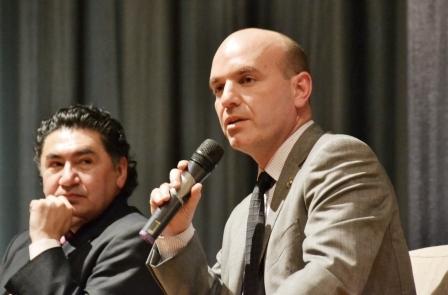The eight hopefuls vying to replace Jack Layton as leader of the federal New Democratic Party engaged in a very cordial debate on “An Agenda for Canadian Cities” before a packed audience at Bloor Collegiate in western Toronto Jan 18.
There was little to differentiate the candidates, who all spoke of the need for more investment in cities, infrastructure, social programs and fairly paid public sector jobs, leaving audience members to form their opinions of the candidates more on personality than policy.
Nathan Cullen, MP for Skeena–Bulkley Valley, appeared to be the clear audience favourite, with his charismatic flair for working sound bites and slogans into his answers.
“I don’t want us to be the conscience of Parliament. I want us to be in charge of the Parliament,” he told the audience to wild applause.
At one point in the debate, Cullen decided to turn a segment about social housing – about which each of the candidates agreed on the need for more immediate investment – into a debate on his controversial proposal to hold “open primaries” for riding candidates in Conservative-held ridings, in which the NDP, the Liberals and the Greens would jointly nominate a single candidate to give voters a clear alternative to Harper.
The proposal proved to be the most contentious point of the debate and drew a fiery rebuke from Parkdale–High Park MP Peggy Nash.
“What we need to do is inspire Canadians to vote for us and not vote for the party that says they’re going to do something and then does the opposite, because we’ve seen too much of that in the City of Toronto,” she said.
Thomas Mulcair added, “If I accepted Nathan’s proposal, I never would have accepted to run and win in the Liberal stronghold of Outremont.”
Mulcair was one of only two candidates who mentioned lesbian, gay, bi and trans issues during the debate. In drawing a distinction between the NDP and the Conservatives, he referred to the current government’s confusion over same-sex marriage last week, asserting that the current government believes that “if you’re gay you’re not really married.”
Churchill MP Niki Ashton also name-checked queer communities during her opening remarks, when discussing the communities that are part of the NDP coalition, and during her closing remarks, when noting that Canadians still face discrimination based on sexual orientation.
Perhaps inevitably in a debate about cities held in Toronto, many of the candidates took the opportunity to pile scorn on Toronto Mayor Rob Ford and his decision to cancel a fully funded rapid-transit plan for the city.
“First we need a better mayor, then a year later we need a better prime minister,” former party president Brian Topp told the audience. “Ford will be remembered for cancelling Transit City.”
Nash referenced the progressives in Toronto who rallied to stop Ford’s proposed cuts to city services in her remarks, comparing that to the anti-Harper coalition she would like to build.
Candidates seemed united on the idea that the federal government should respect the autonomy of Canadian cities and provinces while also proposing that an NDP federal government would entangle itself more deeply on matters of local jurisdiction, such as transit planning.
Paul Dewar, MP for Ottawa Centre, pledged to hand cities control of one more cent of the federal gas tax. At one point, he and Topp debated the merits of pedestrianizing urban cores and adding more bike lanes to cities.
Organizers said more than 100 people were turned away from the over-capacity debate.
The new leader of the NDP will be elected at the national convention at Toronto’s Allstream Centre on March 24.


 Why you can trust Xtra
Why you can trust Xtra


